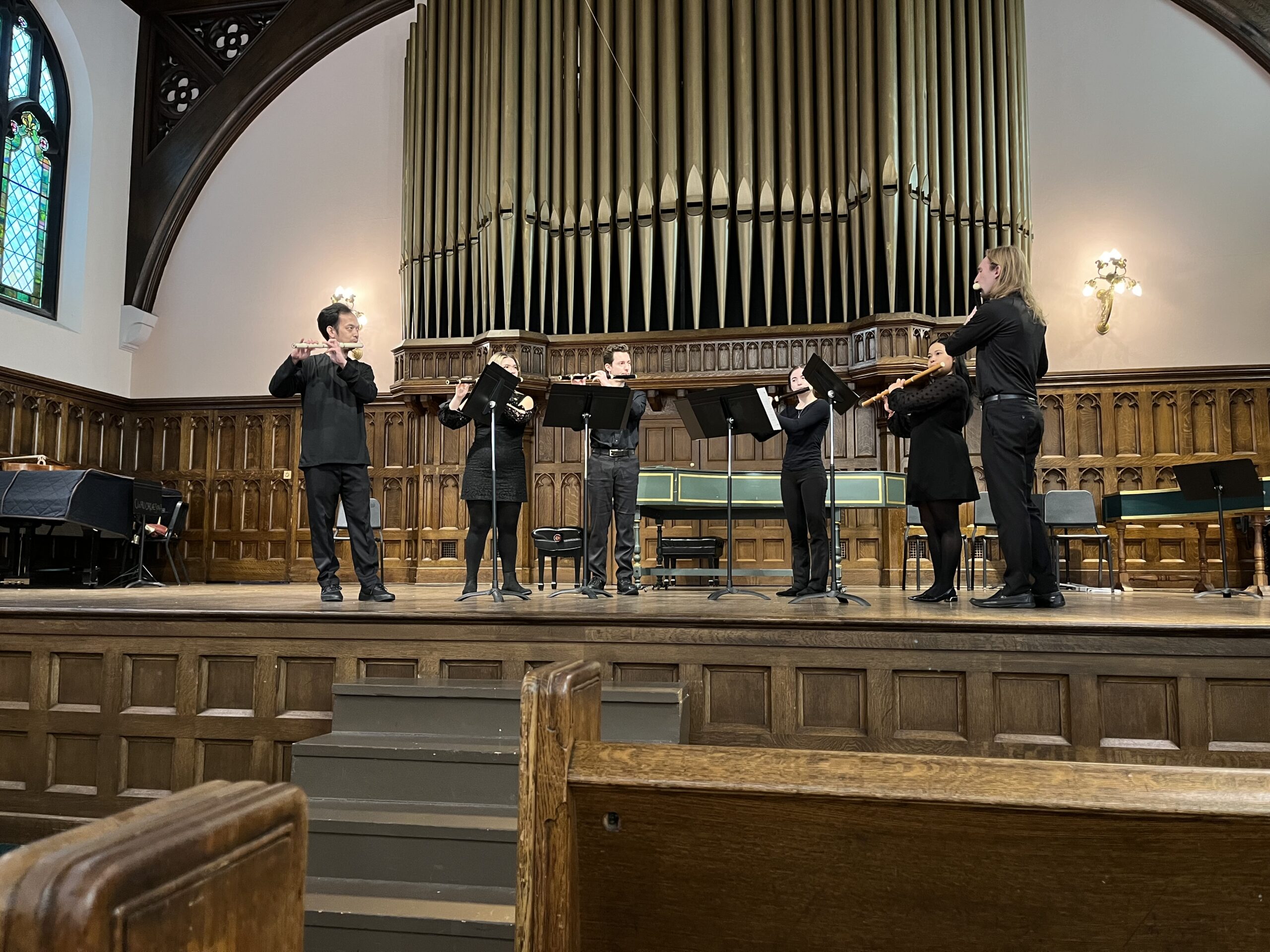Friday, October 25, 2024
Longy’s Baroque Flute Ensemble was one of just six ensembles selected to perform this October at the fourteenth annual Young Performers Festival at the Early Music America (EMA) Summit.
The group, comprised of Hannah Anderson (MM ’24), Tommy Conrad (MM ’24), Maria Milano Melgarejo (UD ’24, MM ’26), Mark Kennedy Rocas (MM ’25), Maria Bustos (UD ’23, MM ’25), John Ray (MM ’25), Joy Ko (MM ’24), and Kristine (Krissy) Terranova (MM ’24), received encouragement from their professor, Na’ama Lion, to apply for this prestigious festival.

Longy’s Baroque Flute Ensemble
“Na’ama Lion organizes an ensemble every semester to work on repertoire, and it is such a wonderful and unique opportunity. She really encouraged us to try to continue playing together and suggested that we apply for this festival and—good news—we were accepted,” said Conrad.
Early Music America (EMA) has proudly presented pre-college and collegiate early music ensembles throughout North America since 2011. The EMA Summit, during which the Baroque Flute Ensemble performed, brings together the early music community of North and South America for three days of presentations, performances, workshops, and networking.
“I think what drew me to early music was that it was so removed from a contemporary life that I am familiar with. It is so obvious how these are just musicians experiencing, in a most basic sense, the same things that we are,” shared Conrad. “It’s because I’m so removed from thinking of the historical events that were going on at the time that I can just appreciate the expression of it.”
Preparing for the festival in weekly rehearsals inspired camaraderie and collective growth among the ensemble members, as they stepped outside of their comfort zones together. For students pursuing or holding advanced degrees in music, the experience of studying and learning baroque flute provides an opportunity to become a complete beginner again—something those who have been playing an instrument for years do not often experience.
“We’re learning together, and it is so humbling as a student with their master’s to be taken down to ground zero in terms of instrumental ability. To get to do that as a group, I think, is very special,” said Conrad. “It’s a lot of fun to play this music because it allows us all to take on different roles musically.”
He added, “The early music community is really one that strongly embraces proficient amateurs—amateurs in the sense of someone who loves it but does not do it as often.”
“There are also some challenges that are more prominent on historical instruments, such as tuning on baroque flute, which forces a player to really develop their flexibility and translate well to playing modern instruments,” remarked Ray.
The ensemble’s exploration of the complexities of performing early music has also deepened their appreciation for its historical context, which they became more acquainted with as they practiced their pieces for the festival: a concerto for five flutes by Boismortier; a traditional French chaconne by Dornel; a trio by Quantz; a whimsical piece with animal sound imitations and classical form by Hoffmeister; and an arrangement of Bach’s aria, “Hört doch! der sanften Flöten Chor,” from BWV 206.
“When playing the baroque flute, we are trying to understand the instrument and the music on its own terms, to better understand the message it sends through history to us,” said Lion.
“Playing a historical instrument is a great way for instrumentalists to appreciate how their instruments have developed over time. Playing on an instrument with a simpler system can seem limiting at first, but creativity is often inspired by the constraints placed upon us,” added Ray.
Longy’s Baroque Flute Ensemble is not only energized by the idea of performing their repertoire, but eager to connect with others who share their collective passion for early music, honoring the rich tapestry of history and emotion woven into each note at the festival and beyond.
